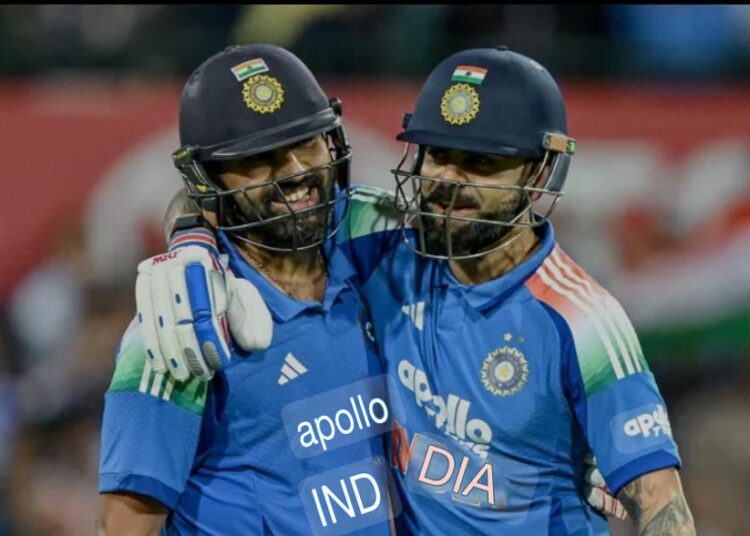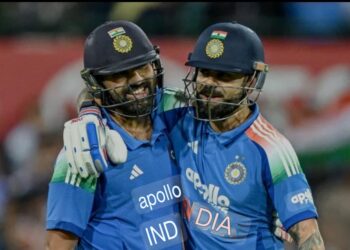What’s the point of scoring a century when your team has already surrendered a three-match series to Australia? What’s the point of reaching a half-century after two ducks that triggered back-to-back defeats and the eventual series loss? Both Rohit Sharma and Virat Kohli — the celebrated RoKo pair — might not even be thinking about India’s defeat right now. And that, perhaps, sums up the problem with Indian cricket.
This is the culture we’ve built over the years — where personal milestones often outshine collective failure. A player’s form becomes a headline, while the team’s loss quietly slips into the fine print. As long as you score your runs, your place is safe; as long as your numbers look good, the narrative stays kind.
Cricket, after all, is supposed to be a team game. But in India, it too often turns into a scoreboard contest between individuals. The system rewards centuries, not comebacks. It celebrates averages, not accountability. A hollow victory is dressed up as brilliance. Like the one at the SCG in the third ODI.
And then comes the twist. The same system that worships runs suddenly decides that runs don’t matter anymore. Rohit losing the ODI captaincy to Shubman Gill — right after winning the Champions Trophy — is a striking example of that irony. If runs were truly the only yardstick (series win or for bigger roles) Gill wouldn’t have been handed the captaincy in both Tests and ODIs.
Historically, every Indian captain has earned the job through years of relentless performance and hard-earned respect. From our first leader to the most recent one, every captain had to prove his worth through weight of runs, wickets, and results. Gill didn’t have to do all that. His appointment was not about numbers — it was about something more intangible.
Gill has been trusted for his integrity, his calmness, and his sense of balance — qualities that seem increasingly rare in modern cricket. Maybe the selectors finally realised that leadership isn’t just about piling up runs; it’s about carrying the team through its toughest moments.
In a cricket culture obsessed with averages and records, Gill’s rise marks a quiet but powerful shift — from numbers to character, from personal milestones to collective belief of playing the game as a team, something which never mattered to Indian cricket.
The whole concept of creating a hero in a team game is fundamentally flawed. You win as a team, and you lose as a team. The effort of the current management must be to erase this VVIP culture that glorifies individuals over the collective.
After all, runs don’t really matter when the team loses a series — do they? So, does that give RoKo the licence to rule the roost? Let’s wait and watch as India begins its journey toward building the team for the 2027 World Cup! Runs Don’t Rescue the Series
What’s the point of scoring a century when your team has already surrendered a three-match series to Australia? What’s the point of reaching a half-century after two ducks that triggered back-to-back defeats and the eventual series loss? Both Rohit Sharma and Virat Kohli — the celebrated RoKo pair — might not even be thinking about India’s defeat right now. And that, perhaps, sums up the problem with Indian cricket.
This is the culture we’ve built over the years — where personal milestones often outshine collective failure. A player’s form becomes a headline, while the team’s loss quietly slips into the fine print. As long as you score your runs, your place is safe; as long as your numbers look good, the narrative stays kind.
Cricket, after all, is supposed to be a team game. But in India, it too often turns into a scoreboard contest between individuals. The system rewards centuries, not comebacks. It celebrates averages, not accountability. A hollow victory is dressed up as brilliance. Like the one at the SCG in the third ODI.
And then comes the twist. The same system that worships runs suddenly decides that runs don’t matter anymore. Rohit losing the ODI captaincy to Shubman Gill — right after winning the Champions Trophy — is a striking example of that irony. If runs were truly the only yardstick (series win or for bigger roles) Gill wouldn’t have been handed the captaincy in both Tests and ODIs.
Historically, every Indian captain has earned the job through years of relentless performance and hard-earned respect. From our first leader to the most recent one, every captain had to prove his worth through weight of runs, wickets, and results. Gill didn’t have to do all that. His appointment was not about numbers — it was about something more intangible.
Gill has been trusted for his integrity, his calmness, and his sense of balance — qualities that seem increasingly rare in modern cricket. Maybe the selectors finally realised that leadership isn’t just about piling up runs; it’s about carrying the team through its toughest moments.
In a cricket culture obsessed with averages and records, Gill’s rise marks a quiet but powerful shift — from numbers to character, from personal milestones to collective belief of playing the game as a team, something which never mattered to Indian cricket.
The whole concept of creating a hero in a team game is fundamentally flawed. You win as a team, and you lose as a team. The effort of the current management must be to erase this VVIP culture that glorifies individuals over the collective.
After all, runs don’t really matter when the team loses a series — do they? So, does that give RoKo the licence to rule the roost? Let’s wait and watch as India begins its journey toward building the team for the 2027 World Cup!
















While I agree that it is Indian cricketing culture that individual records overshadow collective defeats, I don’t subscribe to the view that a player should not strive to do their best in the field even for a lost cause, as this series has been for India. Kohli’s double duck should not mean that he shouldn’t try and score — and succeed — in every game. If the management didn’t think it was worth his while, he should have been dropped and some youngster given a chance. But that didn’t happen. Moreover, a superstar like Kohli or Rohit also have an obligation over above team and self — to their fans, who pay with not just money and time but also invest emotion. That surely must be a driving force for athletes at that level.
You hit the nail, Indranil.
Anyway i think Australia were saving Starc and Hazelwood for bigger challenges.
Good article. Valid points
This is the right start for WC preparation.